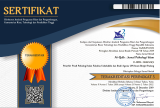Peran Psychological Capital Dan Kebahagiaan Terhadap Workplace Well Being: Studi Pada Pekerja di Universitas Islam X di Pekanbaru
Abstract
Keywords
Full Text:
PDF (Bahasa Indonesia)References
Avey, J. B., Reichard, R. J., Luthans, F., & Mhatre, K. H. (2011). Meta-analysis of the impact of positive psychological capital on employee attitudes, behaviors, and performance. Human Resource Development Quarterly, 22(2), 127–152. https://doi.org/10.1002/hrdq.20070
Bakker, A. B., & Schaufeli, W. B. (2008). Positive organizational behavior: Engaged employees in flourishing organizations. Journal of Organizational Behavior, 29(2), 147–154. https://doi.org/10.1002/job.515
Boehm, J. K., & Lyubomirsky, S. (2008). Does Happiness Promote Career Success? Journal of Career Assessment, 16(1), 101–116. https://doi.org/10.1177/1069072707308140
Chida, Y., & Steptoe, A. (2008). Positive Psychological Well-Being and Mortality: A Quantitative Review of Prospective Observational Studies. Psychosomatic Medicine, 70(7), 741–756. https://doi.org/10.1097/PSY.0b013e31818105ba
Connolly, J. J., & Viswesvaran, C. (2000). The role of affectivity in job satisfaction: A meta-analysis. Personality and Individual Differences, 29(2), 265–281. https://doi.org/10.1016/S0191-8869(99)00192-0
Crede, M., Chernyshenko, O. S., Stark, S., Dalal, R. S., & Bashshur, M. (2007). Job satisfaction as mediator: An assessment of job satisfaction’s position within the nomological network. Journal of Occupational and Organizational Psychology, 80(3), 515–538. https://doi.org/10.1348/096317906X136180
Diener, E., & Seligman, M. E. P. (2002). Very Happy People. Psychological Science, 13(1), 81–84. https://doi.org/10.1111/1467-9280.00415
Fisher, C. D. (2010). Happiness at Work: Happiness at Work. International Journal of Management Reviews, 12(4), 384–412. https://doi.org/10.1111/j.1468-2370.2009.00270.x
Fredrickson, B. L., & Joiner, T. (2002). Positive Emotions Trigger Upward Spirals Toward Emotional Well-Being. Psychological Science, 13(2), 172–175. https://doi.org/10.1111/1467-9280.00431
George, J. M. (1991). State or trait: Effects of positive mood on prosocial behaviors at work. Journal of Applied Psychology, 76(2), 299–307. https://doi.org/10.1002/ss.333
Howell, R. T., Kern, M. L., & Lyubomirsky, S. (2007). Health benefits: Meta-analytically determining the impact of well-being on objective health outcomes. Health Psychology Review, 1(1), 83–136. https://doi.org/10.1080/17437190701492486
Iverson, R. D., Olekalns, M., & Erwin, P. J. (1998). Affectivity, Organizational Stressors, and Absenteeism: A Causal Model of Burnout and Its Consequences. Journal of Vocational Behavior, 52(1), 1–23. https://doi.org/10.1006/jvbe.1996.1556
Joo, B.-K., & Lee, I. (2017). Workplace happiness: Work engagement, career satisfaction, and subjective well-being. Evidence-Based HRM: A Global Forum for Empirical Scholarship, 5(2), 206–221. https://doi.org/10.1108/EBHRM-04-2015-0011
Kagaari, J. R. K., & Munene, J. C. (2007). Engineering lecturers’ competencies and organisational citizenship behaviour (OCB) at Kyambogo University. Journal of European Industrial Training, 31(9), 706–726. https://doi.org/10.1108/03090590710846675
Kubzansky, L. D., Sparrow, D., Vokonas, P., & Kawachi, I. (2001). Is the Glass Half Empty or Half Full? A Prospective Study of Optimism and Coronary Heart Disease in the Normative Aging Study: Psychosomatic Medicine, 63(6), 910–916. https://doi.org/10.1097/00006842-200111000-00009
Kun, A., & Gadanecz, P. (2019). Workplace happiness, well-being and their relationship with psychological capital: A study of Hungarian Teachers. Current Psychology. https://doi.org/10.1007/s12144-019-00550-0
Liantama.L.&Dahesihsari.R (2022). Gambaran Workplace Well Being Karyawan Yang Bekerja Secara Work From Home Pada Masa Pandemi Covid 19 di Jakarta. Jurnal Ilmiah Psikologi Manasa. 11(1).
Luthans, F., Youssef, C. M., & Avolio, B. J. (2007a). Psychological capital: Developing the human competitive edge. Oxford University Press.
Luthans, F., Youssef, C. M., & Avolio, B. J. (2007b). Psychological capital: Developing the human competitive edge. Oxford University Press.
Lyubomirsky, S., King, L., & Diener, E. (2005). The Benefits of Frequent Positive Affect: Does Happiness Lead to Success? Psychological Bulletin, 131(6), 803–855. https://doi.org/10.1037/0033-2909.131.6.803
Lyubomirsky, S., Sheldon, K. M., & Schkade, D. (2005). Pursuing Happiness: The Architecture of Sustainable Change. Review of General Psychology, 9(2), 111–131. https://doi.org/10.1037/1089-2680.9.2.111
Nielsen, K., Nielsen, M. B., Ogbonnaya, C., Känsälä, M., Saari, E., & Isaksson, K. (2017). Workplace resources to improve both employee well-being and performance: A systematic review and meta-analysis. Work & Stress, 31(2), 101–120. https://doi.org/10.1080/02678373.2017.1304463
Page, K. M., & Vella-Brodrick, D. A. (2009). The ‘What’, ‘Why’ and ‘How’ of Employee Well-Being: A New Model. Social Indicators Research, 90(3), 441–458. https://doi.org/10.1007/s11205-008-9270-3
Røysamb, E., Tambs, K., Reichborn-Kjennerud, T., Neale, M. C., & Harris, J. R. (2003). Happiness and Health: Environmental and Genetic Contributions to the Relationship Between Subjective Well-Being, Perceived Health, and Somatic Illness. Journal of Personality and Social Psychology, 85(6), 1136–1146. https://doi.org/10.1037/0022-3514.85.6.1136
Saad Alkahtani, N., M M, S., Delany, K., & Elneel Adow, A. H. (2020). The Influence Of Psychological Capital On Workplace Wellbeing And Employee Engagement Among Saudi Workforce. Humanities & Social Sciences Reviews, 8(5), 233–245. https://doi.org/10.18510/hssr.2020.8522
Segerstrom, S. C. (2007). Stress, Energy, and Immunity: An Ecological View. Current Directions in Psychological Science, 16(6), 326–330. https://doi.org/10.1111/j.1467-8721.2007.00522.x
Seligman, M. E. P. (2002). Authentic happiness: Using the new positive psychology to realize your potential for lasting fulfillment. http://rbdigital.oneclickdigital.com
Seligman, M. E. P., Steen, T. A., Park, N., & Peterson, C. (2005). Positive Psychology Progress: Empirical Validation of Interventions. American Psychologist, 60(5), 410–421. https://doi.org/10.1037/0003-066X.60.5.410
Sheldon, K. M., & Lyubomirsky, S. (2012). The Challenge of Staying Happier: Testing the Hedonic Adaptation Prevention Model. Personality and Social Psychology Bulletin, 38(5), 670–680. https://doi.org/10.1177/0146167212436400
Winurini.Sulis. Workplace Well Being dan Psychological Capital Pegawai Negeri Sipil Di Pemerintahan Kota Yogyakarta (2020). Jurnal Kajian. 25 (3).
Refbacks
- There are currently no refbacks.
Ruang Jurnal,
Fakultas Ushuluddin dan Studi Agama,
UIN Imam Bonjol Padang
Jl. Mahmud Yunus No.6,Lubuk Lintah,
Kota Padang, Sumatra Barat
E-mail: jurnal-alqalb@uinib.ac.id

This work is licensed under a Creative Commons Attribution-ShareAlike 4.0 International License.



